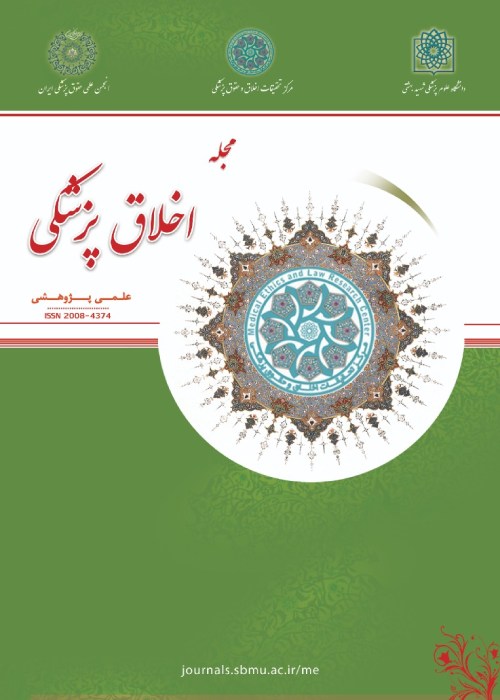The study Ethical aspects of embryo and gamete donation from the four principles of medical ethics point of view
Author(s):
Abstract:
There was a looker on significant progress in the field of medicine sciences and especially in reproductive medicine in the late twentieth century.One of the most important developments is availability of various access to different infertility treatments. Using these methods has raised ethical and legal issues and many ethical and legal considerations. The most important ethical issues pertain to embryo donation, including informed consent, screening of donors and recipients, confidentiality, financial issues, etc. and other issues about donated gametes or embryos.Considering the four principles of medical ethics (including respect for autonomy, beneficence, non-maleficence and justice, it can be concluded that: according to the principle of respect for autonomy, donors and recipients should be aware of what they intend to do as well as its conditions. Therefore, before starting treatment, it should be presented to couples counseling on the risks and the treatment process. Also according to the principle of respect for autonomy, confidentiality of information about embryo donors and recipients is required and it is necessary that documents with high confidentiality to be protected. With regard to principles of beneficence and non-maleficence, the embryo donors and recipients must be screened before handing, some of them will be recognized as eligible characteristics and competencies and some will be excluded from the treatment process. About anonymity of donor and disclosure or non-disclosure of the secret donation to the child and others, different comments have been proposed. But it seems that with respect of the two principles of justice and respect for autonomy, the child's right to be aware about his/her biological origin is a moral imperative. Furthermore, according to the principle of non-maleficence; in terms of jurisprudence and preventing incestuous marriage in the future and possible requirement of the probability the need of donated child to use the transplantation organs, it seems to be necessary in certain cases that, gamete and embryo donors’ identity be registered and how to access this information are determined. Based on the principle of justice, it is better to plan the process in a way that allows providing financial compensation to donors. With regard to the principle of non-maleficence, the considered amount should be chosen in a way to minimize the financial impetus of the donors and possible misuse. Therefore, planning and definition of financial relations between the ovum donor and recipient will be helpful in order to prevent any misabuse. Based on the principle of justice and non-maleficence donated embryos should be kept under quite standard laboratory conditions and all of the safety measures tips for transporting them should be implemented.
Keywords:
Language:
Persian
Published:
Journal of Medical Ethics, Volume:8 Issue: 27, 2014
Pages:
153 to 182
https://magiran.com/p1255976
دانلود و مطالعه متن این مقاله با یکی از روشهای زیر امکان پذیر است:
اشتراک شخصی
با عضویت و پرداخت آنلاین حق اشتراک یکساله به مبلغ 1,390,000ريال میتوانید 70 عنوان مطلب دانلود کنید!
اشتراک سازمانی
به کتابخانه دانشگاه یا محل کار خود پیشنهاد کنید تا اشتراک سازمانی این پایگاه را برای دسترسی نامحدود همه کاربران به متن مطالب تهیه نمایند!
توجه!
- حق عضویت دریافتی صرف حمایت از نشریات عضو و نگهداری، تکمیل و توسعه مگیران میشود.
- پرداخت حق اشتراک و دانلود مقالات اجازه بازنشر آن در سایر رسانههای چاپی و دیجیتال را به کاربر نمیدهد.
In order to view content subscription is required
Personal subscription
Subscribe magiran.com for 70 € euros via PayPal and download 70 articles during a year.
Organization subscription
Please contact us to subscribe your university or library for unlimited access!



